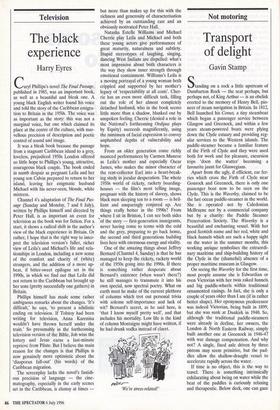Television
The black experience
Harry Eyres
Caryl Phillips's novel The Final Passage, published in 1985, was an important book, as well as a beautiful and bleak one. A young black English writer found his voice and told the story of the Caribbean emigra- tion to Britain in the 1950s. The voice was as important as the story: this was not a marginal voice, but one which claimed its place at the centre of the culture, with mar- vellous precision of description and poetic control of sound and image.
It was a bleak book because the passage from a stagnant Caribbean island to a grey, loveless, prejudiced 1950s London offered so little hope to Phillips's young, attractive, courageous black couple. The book ended in numb despair as pregnant Leila and her young son Calvin prepared to return to her island, leaving her enigmatic husband Michael with his never-seen, blonde, white mistress.
Channel 4's adaptation of The Final Pas- sage (Sunday and Monday, 7 and 8 July), written by Phillips himself and directed by Peter Hall, is as important an event for television as the book was for fiction, For a start, it shows a radical shift in the author's view of the black experience in Britain. Or rather, I hope that is the right way to inter- pret the television version's fuller, richer view of Leila's and Michael's life and rela- tionships in London, including a new sense of the comfort and charity of (white) strangers, and the addition of a more up- beat, if bitter-sweet epilogue set in the 1990s, in which we find out that Leila did not return to the Caribbean but brought up her sons (pretty successfully one gathers) in Britain.
Phillips himself has made some rather ambiguous remarks about the changes. 'It's difficult,' he says, `to present a nihilistic ending on television. If Tolstoy had been writing for television, Anna Karenina wouldn't have thrown herself under the train.' So presumably in the forthcoming television version of the Bible, Job wins the lottery and Jesus earns a last-minute reprieve from Pilate. But I believe the main reason for the changes is that Phillips is now genuinely more optimistic about the `diasporan fall-out' (his words) of the Caribbean migration.
The screenplay lacks the novel's fastidi- ous precision of language — the cine- matography, especially in the early scenes set in the Caribbean, is clumsy at times — but more than makes up for this with the richness and generosity of characterisation achieved by an outstanding cast and an obviously motivated Peter Hall.
Natasha Estelle Williams and Michael Cherrie play Leila and Michael and both these young actors give performances of great maturity, naturalness and subtlety. Stupid stereotypes of laughing, singing, dancing West Indians are dispelled: what's most impressive about both characters is the way they show inner strength through emotional containment. Williams's Leila is a moving portrayal of a young woman both crippled and supported by her mother's legacy of 'respectability at all costs'. Cher- rie has an even more difficult task, filling out the role of her almost completely detached husband, who in the book seems little more than a shadow, blanked out by unspoken feeling. Cherrie (denied a role in the National's forthcoming Oedipus plays by Equity) succeeds magnificently, using the minimum of facial expression to convey unplumbed depths of vulnerability and hope.
From an older generation come richly nuanced performances by Carmen Munroe as Leila's mother and especially Oscar James, who makes the minor character of the rent-collector Earl into a heart-break- ing study in jocular desperation. The whole 1950s world of rickety, rackety boarding- houses — the film's most telling image, pregnant with the history of slavery, shows black men sleeping ten to a room — is bril- liant and unsparingly conjured up. Are things really better in the 1990s? From where I sit in Brixton, I can see both sides 'of the story — first-generation immigrants, never having come to terms with the cold and the grey, preparing to go back home, the second and third generations building lives here with enormous energy and vitality.
One of the amazing things about Jeffrey Bernard (Channel 4, Sunday) is that he has managed to keep the rickety, rackety world of the 1950s going into the 1990s, If there is something rather desperate about Bernard's existence (when wasn't there?) he still manages to transmute it into his own special, now spectral poetry. What on earth must he make of the current plethora of columns which trot out personal trivia with solemn self-importance and lack of wit? Bernard's secret, as he said here, is `that I know myself pretty well', and that includes his mortality. Low life is the kind of column Montaigne might have written, if he had drunk vodka instead of claret.
We're stress-related!'


























































 Previous page
Previous page